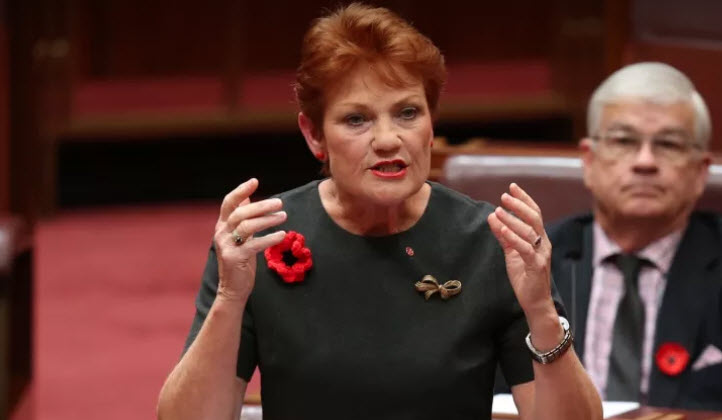Much of the art of politics lies in finding unflattering ways of depicting opponents. Politicians want our votes, so (and especially at election time) they come up with inventive ways of bagging both the policies (and the personae) of their political opponents.

Labor is generally better at the invective than the Coalition. Bill Shorten recently talked about the “knuckle-dragging Neanderthals” of the Liberal Party who opposed federal funding for safe schools programs. Paul Keating branded the entire Senate “unrepresentative swill”. And who, among those who were around at the time, can forget Gough Whitlam calling Queensland premier Joh Bjelke Petersen “a bible-bashing bastard”.
Labelling people you disagree with runs into the broader political sphere, as well. Lately, we’ve heard a good deal of pejorative comment about “populists” and “populism”. So who or what is a populist?
If, for the moment, we overlook the critical way in which the term is used, the answer is straightforward enough. Populists are politicians who try to be popular in a particular way. A populist politician makes overt appeals to ordinary people rather than to elites. On the Australian political scene, Pauline Hanson is clearly a populist. Donald Trump is another example, though unlike Hanson, who had to start her own political party. Rather like the cuckoo, Trump was able to take over the Republican Party from within, pushing rivals out of the nest in the process.
Populist leaders are very good at tapping into public irritation and anger. The European Union’s inability to control immigration has given them a touchstone issue. Under Prime Minister Viktor Orban, Hungary has become the most anti-immigrant nation in the EU. In Italy, the government is now controlled by a coalition of the anti-migrant (and anti-austerity) Five Star and League parties. Prime Minister Giuseppe Comte has laid out a program of anti-austerity policies and a much stronger line on asylum seekers.
Populism is usually associated with the “right” in politics, although there is also a significant populism of the left (think of Chavism in Venezuela). Indeed, in policy terms, there is a significant overlap between the two. The left, at least in its classical form, opposed unaccountable elites (especially those associated with big business) and advocated the interests of “working” men and women in ways that could be said to be populist.
In Australia today, populist leaders generally want immigration numbers reduced, they are sceptical about climate change (or at least renewables-dominated remedies for it), and they favour “commonsense” attitudes to crime, punishment and the threat of Islamic terrorism. They are generally unimpressed by policy narratives based on victimhood.
While not necessarily disagreeing with all these positions, the political class reviles those advocating them, seeing populists as fundamentally motivated by intolerance and racism. There is barely concealed disdain, if not hatred, for those who openly support One Nation.
Whether this is fair or not, the established political parties must be thankful that Hanson lacks the skills needed to manage a successful political operation in the longer-term. Experienced political leaders know that well-managed populist movements have the potential to overturn elites who have grown comfortable in power.
Our saving grace is that, as a society, we have a concern for fairness that is almost palpable. The economic system’s injustices are expertly papered-over by a transfer system whose benefits, while means-tested, are reasonably inclusive. The economy’s productive parts are very productive indeed, and support large numbers of people on pensions. Technology has also helped. Who needs bread and circuses when we have the myriad distractions of social media? Despite this, discontent with the major parties has intensified over the years.
There are no clear antidotes to populism. In ancient Rome, a specific office, that of the tribune of the plebs, was established to advocate for the interests of the plebeian (lowest class). But this didn’t always turn out well, as the fate of two of the most famous tribunes, the Gracchi brothers, testifies.
The Gracchi tried to institute agrarian reform and were popular for a time, but the elites got the better of them. Tiberius Gracchus was clubbed to death at the orders of a group of senators. His brother Gaius was turned upon by those he had worked so hard to help. His proposals to extend Roman citizenship were not welcomed by those who, although poor, already held this privilege. Gaius killed himself before a mob of disgruntled Roman poor could get to him.
Before we dismiss populism, there is something important to consider. Politics exists to enable us (within the law) to advocate causes we believe in. Trump, the master salesman, presented himself as uniquely equipped to respond to this need. As he told the faithful when accepting the Republicans’ nomination: “Remember: all of the people telling you that you can’t have the country you want are the same people telling you that I wouldn’t be standing here tonight.”
Whether elites like populist policies or not is not the point. If citizens are not allowed to use the political process to defend values they hold dear, then what is politics for? Perhaps there are also lessons for the political class in the upsurge in populism. In a democracy, lazy and self-satisfied policymaking has a way of being found out. And believing that one is more virtuous than one’s opponents is the most deadly trap of all.



